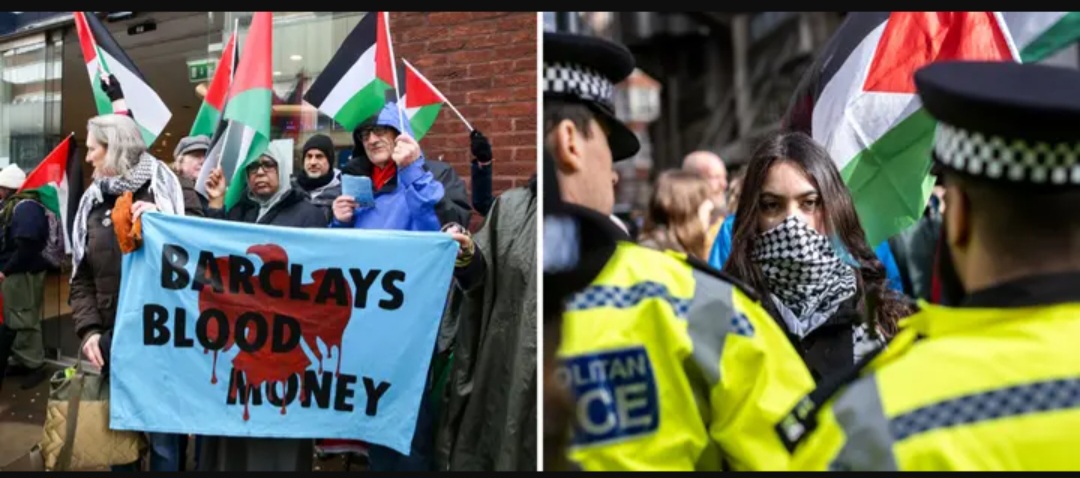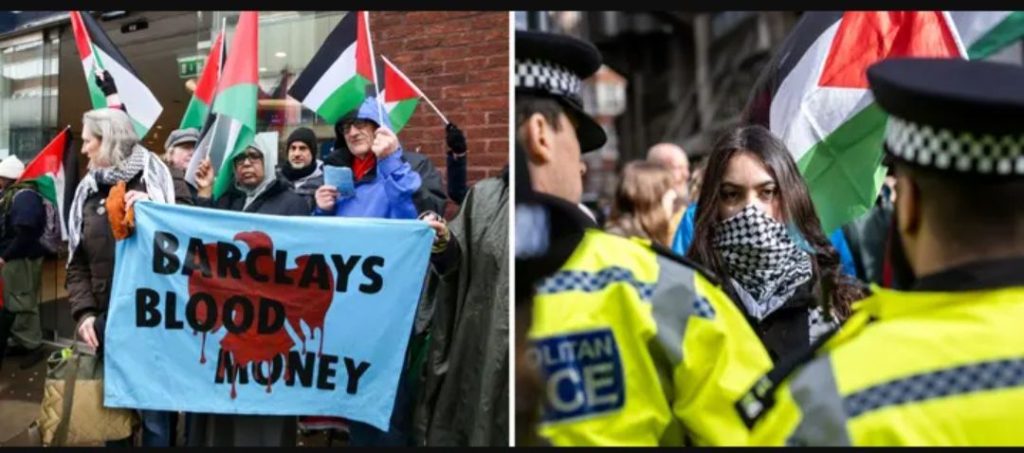
Tensions are soaring across the United Kingdom as Pro-Palestine protesters gather outside Barclays Bank branches nationwide, triggered by Chancellor Rishi Sunak’s recent speech in Downing Street. The demonstration on Tottenham Court Road, London, has garnered particular attention, with a massive police presence attempting to control the crowds. This surge in activism has spilled over to Westminster, raising concerns about potential chaos unfolding in the capital.

The protests are part of a broader series of rallies taking place today, drawing increased scrutiny after Prime Minister Rishi Sunak’s assertion that democracy is under threat from extremists. As activists mobilize, local demonstrations are scheduled for this weekend, leading up to a national march organized by the Palestine Solidarity Campaign in central London on March 9.
Barclays Bank has emerged as the epicenter of these demonstrations, as protesters accuse the financial institution of maintaining substantial financial ties with arms companies supplying weapons and military technology to Israel. Images from the scene on Tottenham Court Road depict a high-stakes showdown between protesters and law enforcement, emphasizing the gravity of the situation.
According to reports by Express, the Palestine Solidarity Campaign (PSC), a key organizer of these protests, contends that Barclays Bank’s alleged financial connections contribute to the perpetuation of conflict in the Middle East. This sentiment has fueled actions against Barclays branches not only in the heart of London but also in towns and cities across the country.
From Abergavenny in South Wales to Worthing in West Sussex, branches of Barclays are being targeted, signaling a coordinated effort by activists to amplify their message. The PSC alleges that by financially supporting arms companies implicated in the Israeli-Palestinian conflict, Barclays is indirectly contributing to the suffering of civilians in the region.
As the day unfolds, the situation remains fluid, and concerns about escalating tensions persist. The clash between protesters and law enforcement on Tottenham Court Road highlights the potential for further unrest. The police’s efforts to shut down the demonstration indicate the gravity with which authorities view the situation, seeking to maintain public order amidst heightened emotions.
In anticipation of more significant confrontations, additional law enforcement resources have been deployed to key protest locations. The specter of chaos looms over Westminster, where activists continue to gather, undeterred by the heightened police presence. The upcoming weekend is poised to witness a continuation of localized protests against Barclays Bank, setting the stage for the national march on March 9.
Barclays has yet to issue a formal response to the allegations made by the Palestine Solidarity Campaign. As the situation unfolds, attention is not only on the immediate clashes but also on the broader implications for the ongoing discourse surrounding the Israeli-Palestinian conflict, arms trade, and financial institutions’ roles in global geopolitics. The coming days are likely to be critical in determining the trajectory of these protests and the impact they may have on public opinion and government policies.




